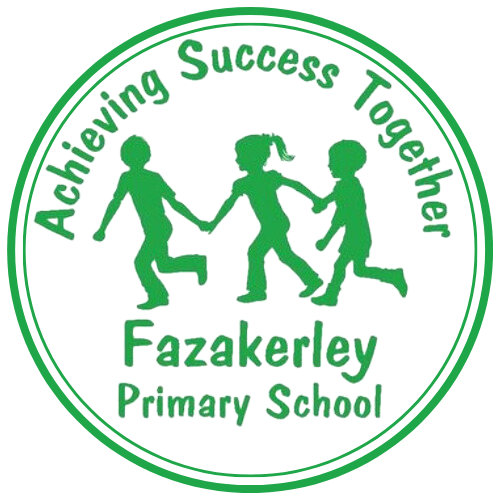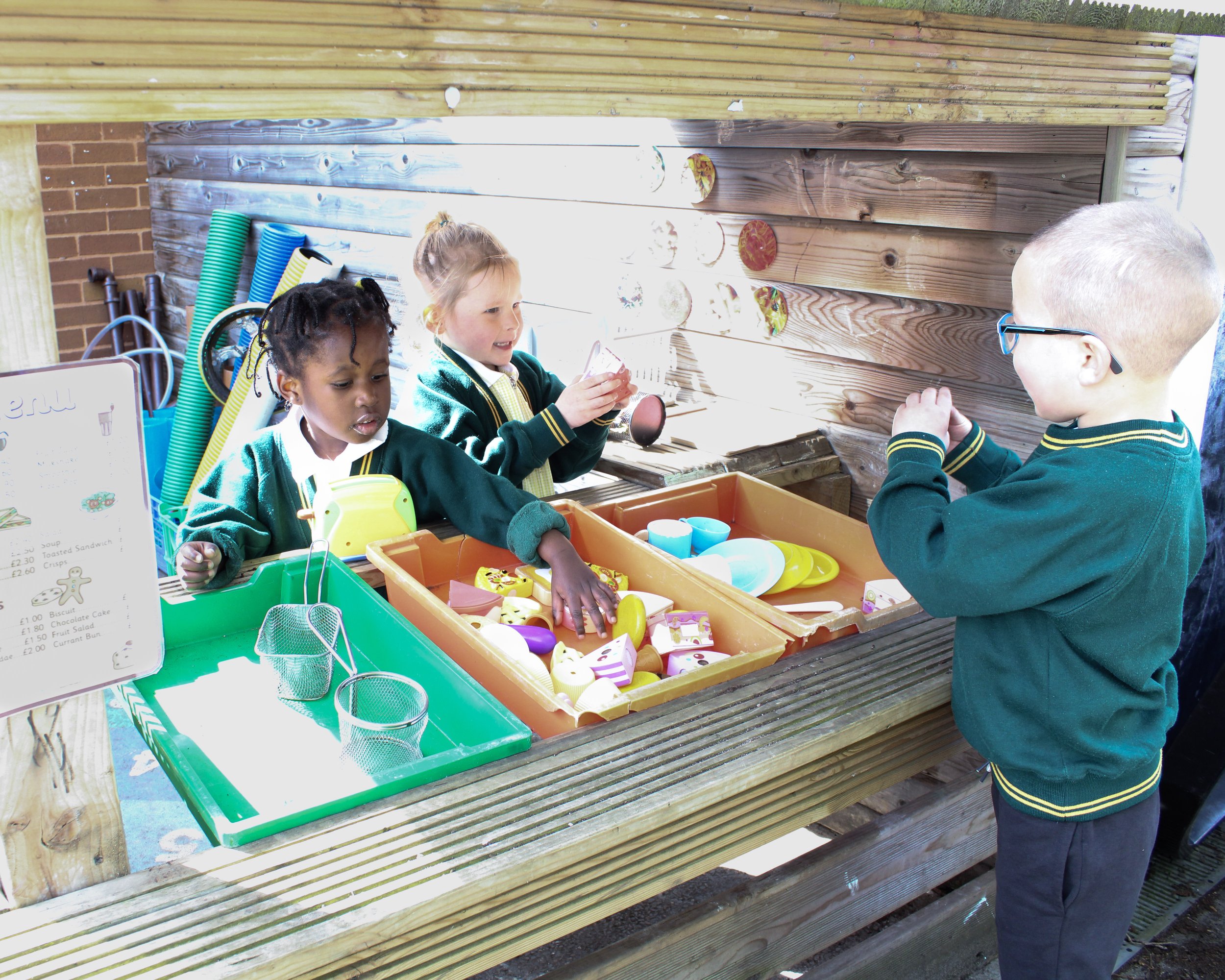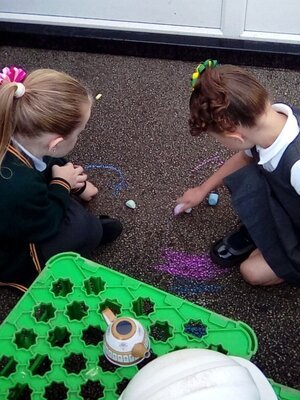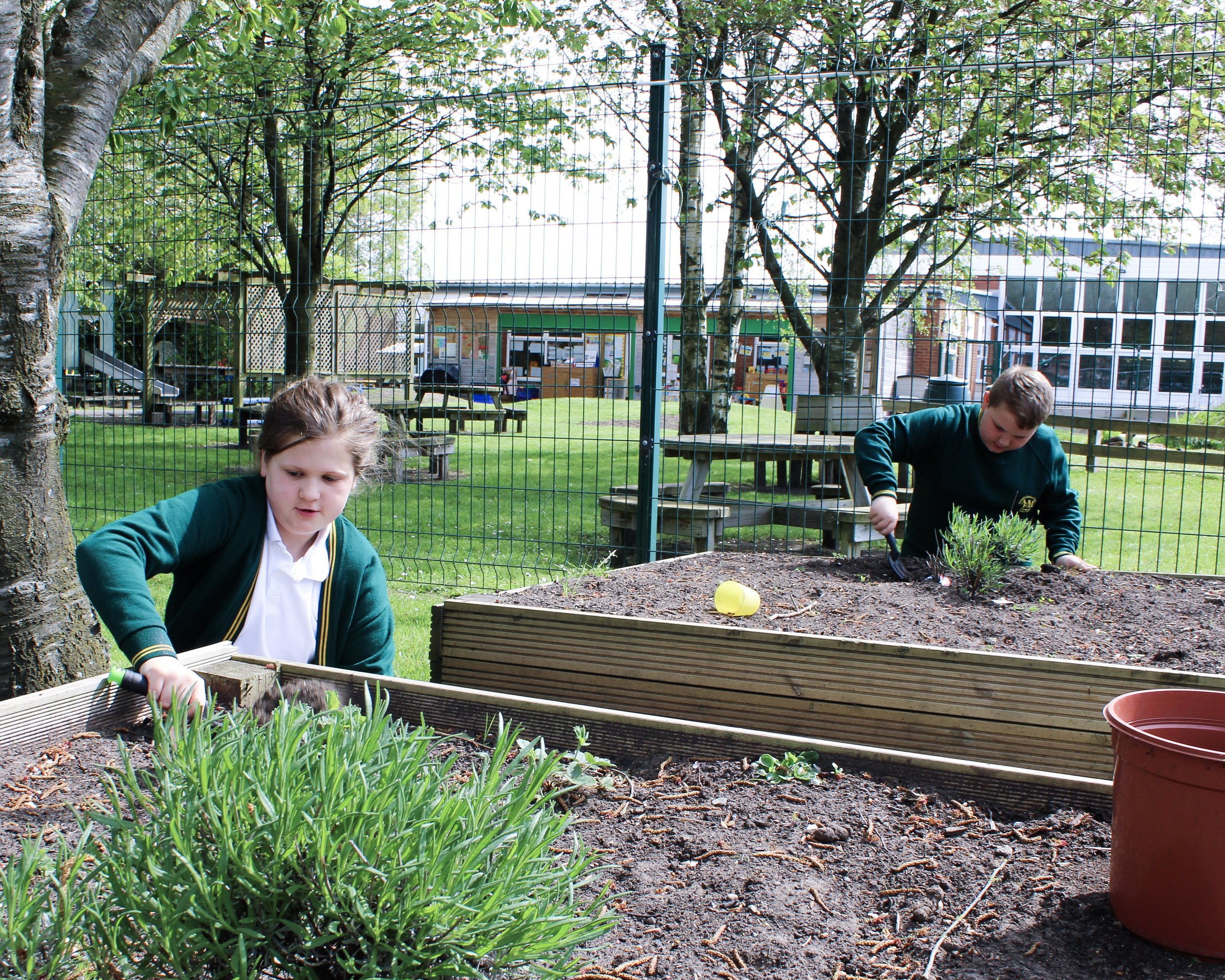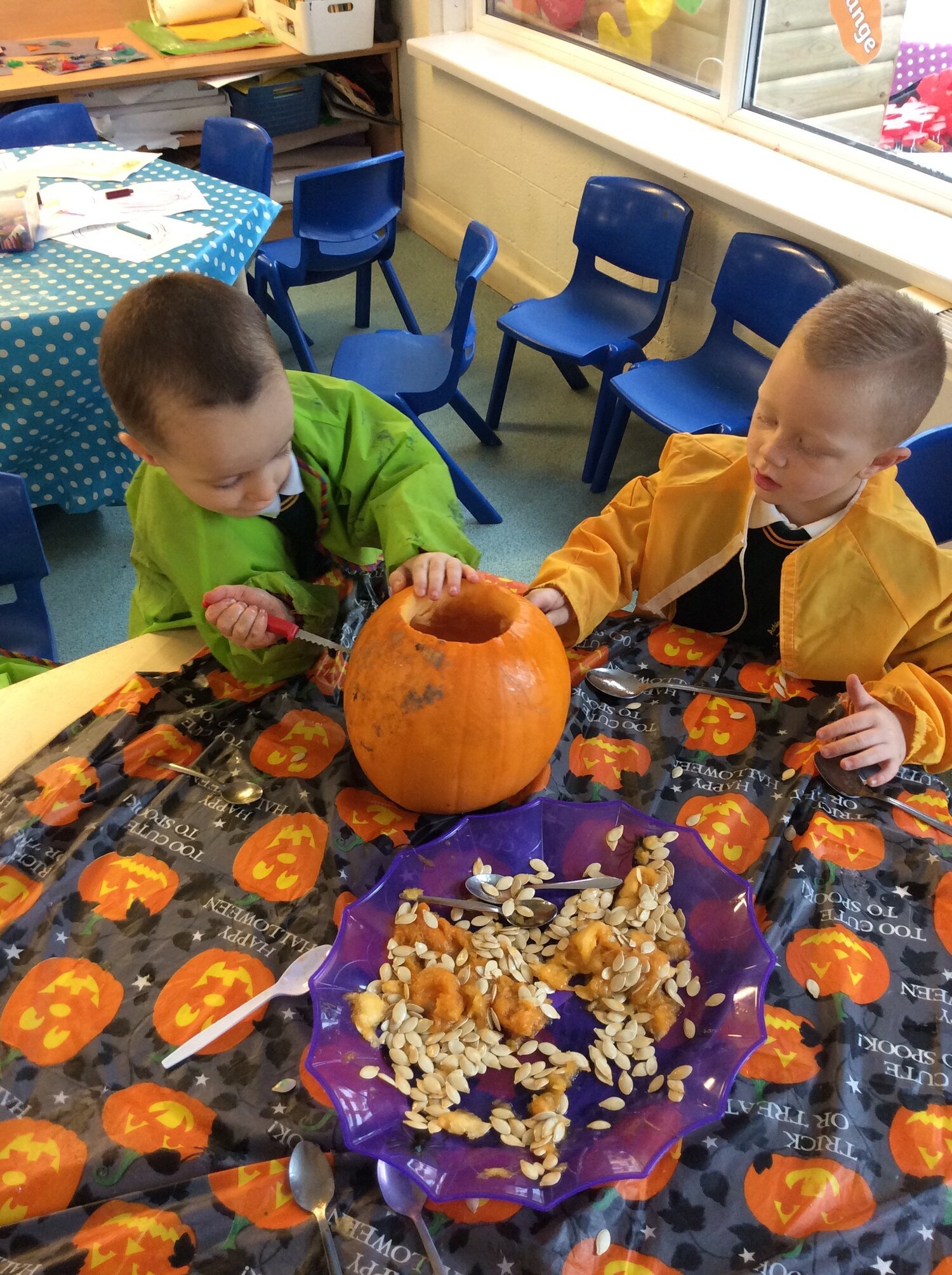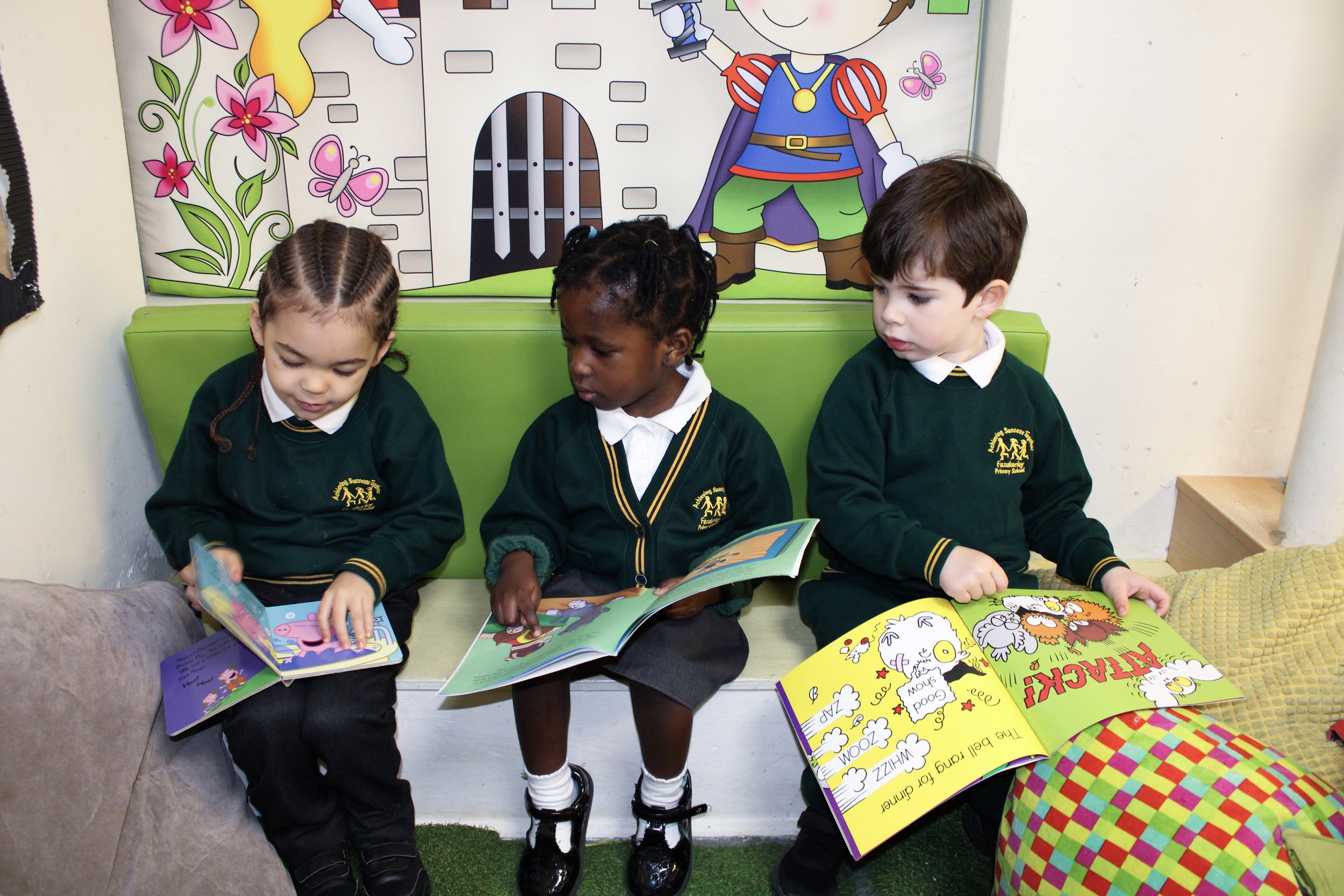
EYFS

EYFS Progression Documents.
EYFS Policies
EYFS Curriculum
Here at Fazakerley Primary School, we follow the EYFS curriculum.
This is a statutory National Curriculum that we are obliged to follow up until our children are entering Year One. At the end of reception all children are assessed on their attainment of the Early Learning Goals. (ELG). There is an ELG for each strand of our curriculum.
The years from pre-birth to five are known as the Foundation Years. The Early Years Foundation Stage statutory guidance (EYFS) is the guidance for anyone providing care and education for children in the Foundation Years. This includes nurseries, pre-schools, childminders and reception classes in schools.
The EYFS guidance has two parts:
The Statutory Framework for the Early Years Foundation Stage.
This sets out the legal requirements which settings have to follow in order to support children’s’ learning and development, to assess their development and to ensure they are well cared for. This document also contains programmes of learning for each of the 7 areas of learning which we cover in Early Years.
Development Matters in the Early Years Foundation Stage.
This contains guidance materials for practitioners on the characteristics of learning and the areas of learning and development that should be offered to children in the foundation years.
The Learning and Development Requirements outline seven areas of learning and development. All the areas of learning and development are important and inter-connected but Communication and Language, Physical Development, and Personal, Social and Emotional Development are priority areas, these are known as The Prime Areas. Children need to be confident in these areas in able to achieve in other areas of learning and life skills.
THE PRIME AREAS
Communication and language
Listening, attention and understanding:
Listen attentively and respond to what they hear with relevant questions, comments and actions when being read to and during whole class discussions and small group interactions.
Make comments about what they have heard and ask questions to clarify their understanding.
Hold conversation when engaged with back and forth exchanges with their teacher and peers.
Speaking:
Participate in small group, class and one-to-one discussions, offering their own ideas, using recently introduced vocabulary.
Offer explanations for why things might happen, making use of recently introduced vocabulary from stories, non-fiction, rhymes and poems when appropriate.
Express their ideas and feelings about their experiences using full sentences, including use of past, present and future tenses and making use of conjunctions, with modelling and support from their teacher.
Physical development
Gross Motor Skills:
Negotiate space and obstacles safely, with consideration for themselves and others.
Demonstrate strength, balance and coordination when playing.
Move energetically, such as running, jumping, dancing, hopping, skipping and climbing.
Fine Motor Skills:
Hold a pencil effectively in preparation for fluent writing – using the tripod grip in almost all cases.
Use a range of small tools, including scissors, paintbrushes and cutlery.
Begin to show accuracy and care when drawing.
Personal, social and emotional development
Self regulation:
Show an understanding of their own feelings and those of others, and begin to regulate their behaviour accordingly.
Set and work towards simple goals, being able to wait for what they want and control their immediate impulses when appropriate.
Give focused attention to what the teacher says, responding appropriately even when engaged in activity, and show an ability to follow instructions involving several ideas or actions.
Managing self:
Be confident to try new activities and show independence, resilience and perseverance in the face of challenge.
Explain the reasons for rules, know right from wrong and try to behave accordingly.
Manage their own basic hygiene and personal needs, including dressing, going to the toilet and understanding the importance of healthy food choices.
Building relationships:
Work and play cooperatively and take turns with others.
Form positive attachments to adults and friendships with peers.
Show sensitivity to their own and to others’ needs.
THE SPECIFIC AREAS OF LEARNING
Literacy
Comprehension:
Demonstrate understanding of what has been read to them by retelling stories and narratives using their own words and recently introduced vocabulary.
Anticipate (where appropriate) key events in stories.
Use and understand recently introduced vocabulary during discussions about stories, non-fiction, rhymes and poems and during role play.
Word Reading:
Say a sound for each letter in the alphabet and at least 10 digraphs.
Read words consistent with their phonic knowledge by sound-blending.
Read aloud simple sentences and books that are consistent with their phonic knowledge, including some common exception words.
Writing:
Write recognisable letters, most of which are correctly formed.
Spell words by identifying sounds in them and representing the sounds with a letter or letters.
Write simple phrases and sentences that can be read by others.
Mathematics
Number:
Have a deep understanding of number to 10, including the composition of each number.
Subitise (recognise quantities without counting) up to 5.
Automatically recall (without reference to rhymes, counting or other aids) number bonds up to 5 (including subtraction facts) and some number bonds to 10, including double facts.
Numerical Patterns:
Verbally count beyond 20, recognising the pattern of the counting system.
Compare quantities up to 10 in different contexts, recognising when one quantity is greater than, less than or the same as the other quantity.
Explore and represent patterns within numbers up to 10, including evens and odds, double facts and how quantities can be distributed equally.
Understanding the world
Past and Present:
Talk about the lives of the people around them and their roles in society.
Know some similarities and differences between things in the past and now, drawing on their experiences and what has been read in class.
Understand the past through settings, characters and events encountered in books read in class and storytelling.
People, Culture and Communities:
Describe their immediate environment using knowledge from observation, discussion, stories, non-fiction texts and maps.
Know some similarities and differences between different religious and cultural communities in this country, drawing on their experiences and what has been read in class.
Explain some similarities and differences between life in this country and life in other countries, drawing on knowledge from stories, non-fiction texts and (when appropriate) maps.
The Natural World:
Explore the natural world around them, making observations and drawing pictures of animals and plants.
Know some similarities and differences between the natural world around them and contrasting environments, drawing on their experiences and what has been read in class.
Understand some important processes and changes in the natural world around them, including the seasons and changing states of matter.
Expressive arts and design
Creating with materials:
Safely use and explore a variety of materials, tools and techniques, experimenting with colour, design, texture, form and function.
Share their creations, explaining the process they have used.
Make use of props and materials when role playing characters in narratives and stories.
Being imaginative and Expressive:
Invent, adapt and recount narratives and stories with peers and their teacher.
Sing a range of well-known nursery rhymes and songs.
Perform songs, rhymes, poems and stories with others, and (when appropriate) try to move in time with music.
The learning and development requirements also describe three characteristics of effective teaching and learning:- This basically tells us how children learn best.
Playing and exploring - children investigate and experience things, and ‘have a go’;
Active learning - children concentrate and keep on trying if they encounter difficulties, and enjoy achievements;
Creating and thinking critically - children have and develop their own ideas, make links between ideas, and develop strategies for doing things.
The Early Learning Goals listed above are the “Goal” for the end of Reception, during your child’s time in Nursery and Reception we will be sequencing your child’s experiences and learning in order to progress towards these levels by the Summer term in Reception.
EYFS Vision
Intent
At Fazakerley Primary School our curriculum is designed to recognise children’s prior learning from previous settings and their experiences at home, to provide first hand learning experiences, whilst allowing the child to build up resilience, ambition and integrity. Every child is recognised as a unique individual and we celebrate and welcome differences within our school community. The ability to learn is underpinned by the teaching of basic skills, knowledge, concepts and values. We provide adult focused learning activities and enhanced continuous provision opportunities in order to engage learning and encourage a love of learning and enable children to consider school to be a consistently happy and safe place.
We use a positive reinforcement approach to promote positive attitudes to both learning and behaviour. This reflects the values and skills needed to promote thinking skills, and the adaptability needed to succeed in future learning.
Implementation
Across our EYFS we follow the Early Years Statutory Framework for the Early Years Foundation Stage published by the DfES. This framework specifies the requirement for learning and development within the EYFS and provides 7 areas of learning that we assess children on throughout their time in EYFS.
There are 3 prime areas:
• Personal, Social and Emotional Development
• Physical Development
• Communication and Language Development
In order for children to succeed in further learning they need to acquire mastery of these areas of learning.
There are 4 specific areas:
• Literacy
• Mathematics
• Understanding the World
• Expressive Arts and Design
Within the first term of Nursery we focus mainly on the 3 prime areas in order to promote children’s social skills and communication skills. Whilst in Nursery the children will work within small groups with an adult at various activities. There will be a daily literacy or phonics input – within Nursery we concentrate on phase 1 of the Letters and Sounds programme in order to prepare the children for reading and writing in Reception. There will also be a weekly lesson of Jigsaw Jenny which is a PSHE programme that the whole school follows and children begin to learn these PSED lessons from entry to Nursery.
In reception the children will have a daily literacy, maths and phonics lesson together with the weekly PSHE lesson in line with Jigsaw Jenny. We are now following the Read Write Inc programme within EYFS and the rest of Fazakerley Primary School.
Our learning takes place through different activities including adult led focused activities, child initiated play and independent focused activities. The staff interact with children during their child initiated play, modelling both language structure, scaffolding of ideas and assessing the child’s abilities whilst they are doing this. This information is then fed back to the rest of the team during weekly assessment meetings and the whole team help to build a picture of each child’s abilities and any areas that we need to monitor.
We use both our indoor and outdoor provisions to support our children’s learning and they have free flow access to both areas during child initiated continuous provision. By using continuous provision we encourage our children to be independent thinkers and develop the characteristics of effective learning that will help them with their lifelong learning.
• Playing and exploring
• Active learning
• Creating and thinking critically
We encourage parents to take an active role in their children’s learning by sharing achievements at home through their child’s private Class Dojo portfolio, and also inviting parents to stay and play sessions throughout the year in both EYFS year groups.
We recognise that it is essential that children are educated citizens and are aware that children arrive at our school with varied life experiences. We aim to give all children experiences that they may not have had before both within the setting and on learning visits out of the school. We want our children to experience the world and appreciate what we have around us.
Our lessons and provision are informed by children’s interests that they have demonstrated and also through our observations that are carried out daily by all staff members. This will feed into our planning when we witness misconceptions and areas that require further support and teaching. In reception our formal work will be recorded both within our workbooks.
Impact
Our children are assessed both formatively and summatively . We assess our children every half term and use this information to inform our next steps for each individual child. Throughout EYFS we assess all of our children against agreed levels of child development. We consider the “Observation Checkpoints” identified within the Development Matters document and if we have concerns then we identify these children with our school Sendco and have discussions with parents/carers. Every term we submit phonics data to allow our Phonics lead to see our progress and also provide information for the EYFS lead to analyse trends and areas that require further attention. In order to ensure that our assessments and judgements are accurate we attend local cluster group moderation meetings and also have in house moderation every half term.
When our children begin Nursery we complete a baseline assessment of their knowledge and skills and this is then used as a basis for their learning journey. Our basis for this baseline assessment is to use the Observational Checkpoints for children who are 3 years old. We also build up a picture of each child’s first few weeks in the setting. We then build upon this every half term and follow every child’s individual learning until the end of Reception when they complete the EYFSP. (Early years foundation stage profile) We use the NFER scheme to assess each child’s baseline abilities when they join our reception classes in the first half term.
At the end of reception we assess the children in their reading ability by listening to them read their current reading book in order to verify our children’s reading ability and skills as part of their transition process. We believe that transition is an important part of a child’s journey into the next part of their school career and we do all that we can to make this as seamless as possible. The assessment information we gain aids transition into Year One when we have our transition meetings and advise Year One teachers of every child’s ability and strengths.
The impact of our curriculum will also be measured by how effectively it helps our pupils develop into well rounded individuals who embody our values and carry them alongside knowledge, skills and attitudes to make them lifelong learners and valuable future citizens.
EYFS Pedagogies.
Within our Early Years department we work within the guidance of the EYFS statutory curriculum. We promote the above values at all times with our children.
During lessons in Reception:
Children are taught by an adult using resources that will appeal to all styles of learning, talking, modelling, illustrating, using physical resources, videos and powerpoint slides.
Teachers use flip charts, visualisers, physical resources and the interactive whiteboard screen to model the concepts that we are learning.
Adults then follow up with groups who are working on the more complex part of the concept and chunk the follow up to stop and explain, model as the activity continues.
Children are encouraged to continue their learning independently around our learning objectives by using quality continuous provision in order to reinforce the learning objectives that are being taught.
All staff work hard to promote positive, supportive relationships with our children in order to help them to achieve their full potential.
Children are encouraged to become independent in their follow up learning and to try activities that they may not be as confident with.
In Nursery:
Staff concentrate on the prime areas of learning initially in order to allow our children to access further learning.
Adults work closely with children to promote their self confidence and build a can do attitude.
Adults teach children in small groups and then follow up with practical activities.
Adults use song/rhyme and story where possible to teach new concepts to the children.
Children follow a daily routine and begin to learn this in anticipation of what is coming next.
EYFS Environment
Our Classes within EYFS
We have a large EYFS stage department at Fazakerley Primary School, we currently have around 70 children within our Nursery and Reception classes.
We have a large nursery, which can provide you with sessions in the mornings, afternoons, full days or we will try to work with you to provide the sessions you need.
Our Nursery staff include an experienced teacher, together with an experienced Learning Support Assistant. We also mentor teaching students from local colleges, who are fully supervised during their teaching experiences.
Our 2 reception classes are next door to the Nursery, which provides our children with a smooth transition to an area they are already familiar with.
Reception staff include 2 experienced teachers, 2 s Learning Support Assistants and 1:1 support staff. Your child will be allocated a class within reception but during child initiated play they are able to move between the two classes and the outdoor areas as they wish.
Indoors
Nursery
Within our EYFS department, we have a large nursery with a separate quiet room and a large conservatory extension.
Children are encouraged to access all of our continuous provision areas and we support them with these experiences whilst nurturing their learning and development using their own interests.
These as well as our other areas are utilised by children in their own child initiated play and also in small group sessions with our experienced nursery staff.
Reception
Within reception we have 2 classrooms, an intervention room and a very large conservatory extension. This gives us a huge space for the children to investigate and utilise all of our different resources. Staff follow the children’s interests and each week we provide enhancements to these areas to develop the children’s learning.
Outdoors
We are fortunate that we have a very large area both indoors and outdoors. Children have fully supervised access to our outdoors area and we use this to support our learning and teaching throughout the year. Children are given opportunities to develop their own interests and the teaching team then embrace this to encompass the EYFS curriculum. Examples of activities children enjoy outdoors are:
large scale mark making to develop our muscles
using our bikes and scooters around the trail
clambering over the timber trail and using the slide and climbing wall
sitting quietly in the den and reading
building dens
making role play areas
constructing obstacle courses
gardening
creating tasty meals in the mud kitchen
creating in the free modelling area
The list is endless and we are fortunate to have a huge private and secure outdoor space for our children to access.
It is helpful if you can provide your child with waterproof clothing and a pair of wellies so that they are able to access the outdoor area in all weathers.
Nursery children have their dinner within the KS1 hall which is next door to Nursery.
Reception children have their dinner within the KS2 hall which is located within the KS2 area of the school. This is a longer walk that allows the children to see the rest of the school and sometimes the excitement of seeing older siblings whilst they walk to lunch.
Information for Parents and Carers

Nursery and Reception are the time when your child is embarking on their school journey.
We are honoured that you have chosen us to nurture your children and join them on their learning journey.
We are aware that whilst we cover many aspects in school we do not see every part of a child’s development and that’s where we ask for your help. We value the contribution parents make and build an atmosphere of trust and respect between home and school. As the people who know their children best, parents are encouraged to work in partnership with staff in the learning and development process.
We will send home wow moments, we ask you to let us know of something you are proud of or surprised by that we can share with our teachers and friends and celebrate in school.
Reception children are given home readers, we ask that you spend time daily reading with your child and supporting their learning. By working together we are doubling the impact and this can make a real difference to your child. It is always obvious which children read at home and which children only read in school. Give your child the best opportunities by spending just a few minutes every day practising their reading and also learning high frequency words.
Parents and carers of children in the Early Years Foundation Stage (Nursery and Reception) can access useful information regarding their children’s learning and development from the following websites and documents:
We also have listed some useful websites you may wish to visit with your child at home to further support their education. If you have some favourites not listed, please speak to a member of staff so we can add to the list and share with other families.
At the beginning of the school year, we will also invite you to a session to explain how we teach phonics and how you can support this at home.
We are in the process of setting up Stay and Play sessions which will take place within Nursery and Reception on a regular basis, we would love you to come along and take part in some learning within the school environment to support your child. If you are not able to attend because of prior commitments, then we will welcome a significant adult to come and experience an hour of school with your child.
EYFS Gallery
